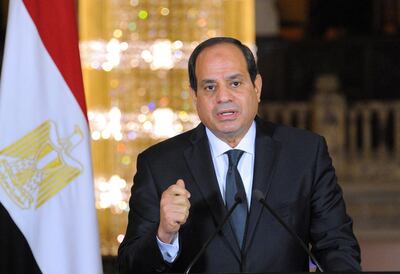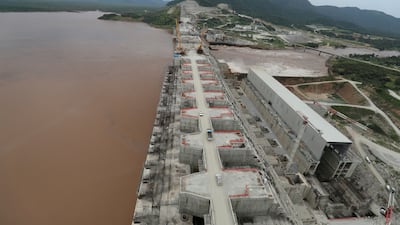Egypt's President Abdel Fattah El Sisi called again on Ethiopia to enter an agreement on the operation of its dam on the Nile while assuring Egyptians that he would not allow their country's share of the river's water to be affected.
"Harming Egypt's national security is a red line that cannot be crossed regardless of what anyone thinks," Mr El Sisi told a crowd of about 50,000 flag-waving supporters in Cairo late on Thursday.
"Embracing wisdom and preferring peace does not in any way mean allowing harm to come to this nation's interests."

The president's latest remarks on the contentious Grand Ethiopian Renaissance Dam come less than two weeks after the UN Security Council met to discuss the issue at the request of Egypt and fellow downstream nation Sudan. No decision has been made by the council, but consultations behind closed doors have continued since the July 8 meeting.
Egypt is alarmed that the dam will significantly reduce its share of the Nile waters on which it depends for nearly all its fresh water needs. Such a reduction, it argues, would wipe out hundreds of thousands of jobs and upend its food security.
Mr El Sisi assured the crowd at the Cairo International Stadium that he would not allow this to happen.
“Your concern is legitimate, but things will be fine and our plans are going great. Don’t worry about a thing. Please, live your lives. It is unbecoming for us to worry so much,” he said.
“I and the army will have to perish first before any harm comes to Egypt.”
Sudan is also worried about its water share and says it needs Addis Ababa to fully co-ordinate with it on the operation and filling of the dam to guard against flooding and ensure that its own power-generating dams on the Nile operate smoothly.
Ethiopia, for its part, has repeatedly assured Cairo and Khartoum that no harm would come to them from the dam, but it refuses to enter a legally-binding agreement on the filling of the dam and has rejected proposals for the United States, UN and the EU to join negotiations over its $5 billion hydroelectric project.
“We in Egypt have expertise that is available not only for Sudan and Ethiopia but to the whole of Africa on condition that no one comes near Egypt’s water,” Mr El Sisi said.
“Let us reach a legally binding agreement that will bring us goodness, so that we all live in peace and security, shielded from all kinds of threats. I am saying this to all those interested in peace and security,” he said.
Mr El Sisi, an army general elected president seven years ago, has hinted previously that Egypt could resort to military action to resolve the decade-old dispute with Ethiopia. He said Egypt preferred a diplomatic solution to the dispute but was not prepared to indefinitely negotiate over the dam. No one should assume to be beyond the reach of his military, he said in late March.
His comments on Thursday night were made at a ceremony to mark the launch of an ambitious, three-year programme to improve services and facilities available to 58 million Egyptians – more than half the population – in rural areas at the cost of 700 billion Egyptian pounds ($44.6 billion).






